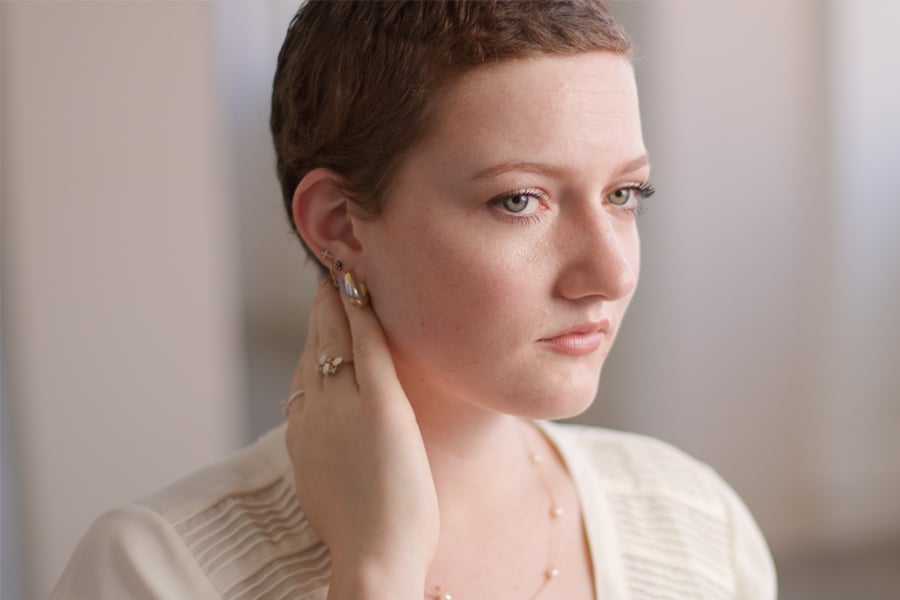Supporting a Loved One Through Their Wig Journey

Watching someone you care about struggle with hair loss is tough. They might feel lost, overwhelmed, or upset, especially when they start considering a wig. If you’re trying to help, you might not know what to do or say to make things easier for them.
At Daniel Alain, we know this journey well. For over 20 years, we’ve been creating top-quality human hair wigs and toppers. Aside from making some of the world’s most natural-looking and comfortable hairpieces, we also understand the emotional toll of hair loss. We’re experienced in helping people and their cheerleaders through this sensitive time.
This article will give you clear advice on how to be there for your loved one. We’ll give you tips on talking about wigs in a caring way and help you understand the practical side of choosing and looking after a human hair wig. By the end of this article, you’ll feel more prepared to support your loved one and help them feel confident and loved.
Dealing with hair loss

Dealing with hair loss is often a deeply personal and emotionally charged experience. For someone going through this, it can feel like a part of their identity is slipping away, leading to feelings of sadness, insecurity, or even grief. As a loved one, your support can be a crucial anchor during this turbulent time.
The most impactful way you can help is by offering a listening ear and a shoulder to lean on, without judgment or unsolicited advice. Acknowledge their feelings and let them know it's okay to feel upset or vulnerable. When discussing potential solutions like wigs, approach the topic with sensitivity and empathy. Encourage them to express their concerns and desires, and offer to assist in researching options, but always respect their pace and decisions. Remember, your role isn't to fix the situation but to provide a safe and supportive space where they feel seen, heard, and valued, no matter how they choose to address their hair loss.
Here are some things to remember:
- Open Communication: Encourage them to express their feelings and concerns about hair loss. Let them know you’re there to listen without judgment.
- Validate Their Emotions: Let them know it’s okay to feel upset, frustrated, or overwhelmed. Reassure them that their feelings are valid and that you're there to support them.
- Offer a Listening Ear: Encourage open conversations about their concerns and anxieties. Sometimes just having someone to talk to can make a significant difference.
- Share Stories of Resilience: Remind them of inspiring stories from others who have successfully coped with hair loss and embraced wigs as a solution.
- Explore Resources: Research reputable sources about hair loss concerns, treatments, and coping strategies. Share this information with your loved one to empower them.
- Emphasize Their Inner Beauty: Reinforce that their worth is not solely defined by their appearance. Highlight their other qualities, talents, and strengths.
.png?width=900&height=506&name=Screen%20Shot%202022-10-25%20at%2011.13.34%20AM%20(2).png)
Finding the right wig

The perfect wig can help restore your loved one’s confidence, dignity, and sense of self. But finding the right wig requires research. Start by exploring different wig options and styles online together. Learn about the differences between synthetic and human hair wigs, read reviews from real customers, and discuss budget. Consider consulting with a wig specialist who can guide you and your loved one in discovering a wig that aligns with their needs and preferences. Finally, encourage trial and error. The first piece your loved one tries on may not be the perfect fit and finding the right wig might take some time. Be patient and support them as they try different pieces until they find the one that feels and looks just right.
- Hair Type: Choosing between synthetic and human hair is often one of the first decisions. Human hair usually offers a more natural look and versatility, whereas synthetic hair can be easier to maintain and often more affordable.
- Cap Construction and Comfort: The wig cap should provide a comfortable fit and look natural. Options like a lace front for a realistic hairline and a skin top for a scalp-like appearance are important. Comfort is key, especially if the wig is to be worn daily.
- Maintenance and Care: Understanding the care required for the wig helps in maintaining its longevity and appearance. Human hair wigs usually need more care compared to synthetic wigs.
- Fit and Size: Ensuring the right fit is essential for comfort and security. Wigs come in various sizes, and a properly fitting wig can make a significant difference in comfort and appearance.
- Budget: Wigs vary widely in price. It's important to find a balance between quality and what is financially comfortable.
Supporting your loved one

Being there for your loved one as they adapt to wearing a wig is a beautiful way to show your care and compassion.
- Offer Genuine Compliments: Boost their confidence by complimenting how great they look in the new wig. Your positivity can make a world of difference.
- Attend Appointments Together: If they’re visiting a wig specialist or undergoing medical treatments, accompany them to appointments to provide emotional support.
- Create a Safe Space: Let them know they can always be themselves around you, wig or no wig. Your unconditional love and acceptance mean a lot.
Your presence and empathy make a significant impact on your loved one’s journey. By supporting them through this process, you’re helping them embrace their new look with confidence and courage.
What are my next steps in supporting my loved one’s wig journey?
Understanding how to navigate the complex emotions associated with hair loss, while trying to offer the best support, can be daunting. You might have found yourself at a loss, unsure of the right words to say or the most helpful actions to take. This reflects the deep care and concern you hold, but it also highlights the delicate balance you strive to maintain in being a supportive and empathetic companion during this sensitive time.
From this article, you’ve learned key things about helping someone deal with hair loss and choosing a wig. We discussed why it’s helpful to go with them to appointments, the importance of giving honest and thoughtful compliments, and how to make them feel supported and safe. This information is meant to help you be a better support person.
Be there for your loved one as they go through this process, using the tips and advice you've read here. Your support can really make a difference. For more information and help, please check out more articles and resources from Daniel Alain. We offer more advice on wig care and how to find the right piece. However, this journey is about more than just finding the right wig; it's about growing stronger and closer together.


.jpeg)
